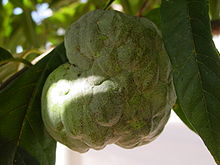Annonaceae
| Annonaceae | |
|---|---|
 |
|
| Annona squamosa fruit | |
| Scientific classification | |
| Kingdom: | Plantae |
| Clade: | Angiosperms |
| Clade: | Magnoliids |
| Order: | Magnoliales |
| Family: |
Annonaceae Juss. |
| Genera | |
|
See text |
|
| Synonyms | |
|
Hornschuchiaceae J. Agardh |
|
See text
Hornschuchiaceae J. Agardh
Monodoraceae J. Agardh
The Annonaceae are a family, the custard apple family, of flowering plants consisting of trees, shrubs, or rarely lianas. With 108 accepted genera and about 2400 known species, it is the largest family in the Magnoliales. Several genera produce edible fruit, most notably Annona, Anonidium, Asimina, Rollinia, and Uvaria. Its type genus is Annona. The family is concentrated in the tropics, with few species found in temperate regions. About 900 species are Neotropical, 450 are Afrotropical, and the other species Indomalayan.
The species are mostly tropical, some are mid-latitude, deciduous or evergreen trees and shrubs, with some lianas, with aromatic bark, leaves, and flowers.
Monophyly and inter-familial systematics have been well supported for Annonaceae by a combination of morphological and molecular evidence. The APG II system places Annonaceae as most closely related to the small Magnoliid family Eupomatiaceae.
...
Wikipedia
